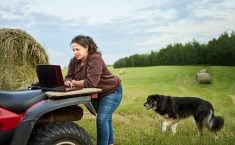Natural gas prices have steadily increased since June 2020. This increase has been due to record-breaking heat in the summer of 2021, numerous hurricanes, and other weather issues, as well as a strong demand for natural gas.
Farmers in particular are affected by the higher prices because it can be one of their significant expenses. The Carbon Tax Rebate Program is a proposed program to return fuel charge proceeds directly to farming businesses in Ontario, Manitoba, Saskatchewan and Alberta through a refundable tax credit.
It allows farmers whose expenses exceed $25,000 and are actively engaged in farming activities to get a return of their fuel charge at a rate of $1.47 for 2021 and $1.73 for 2022 per every $1,000 in eligible farming expenses. This credit would then be included in taxable income.
Read Also

Higher farmland taxes for investors could solve two problems
The highest education and health care land tax would be for landlords, including investment companies, with no family ties to the land.
For example, in 2022, using the rate of $1.73 per $1,000 of expenses, $500,000 in expenses would incur a rebate of $865.00 and $1 million in expenses would incur a rebate of $1,730.
The threshold outlined by the Canadian government in order for farms to be eligible for the carbon rebate is noted to be set at eligible expenses of at least $25,000. Eligible expenses do not include non-arm’s length transactions. Non-arm’s length transactions are defined as when both parties, the seller and the buyer, have a personal relationship.
These relationships could be through family ties, as well as partnerships. An example of a non-arm’s length transaction would be when a father or mother decides to transact with their son or daughter.
While the father/mother may be able to be more profitable transacting with other individuals that they are not related to, the father/mother may choose to transact with their son or daughter at a lesser price, due to the nature of the relationship, making it a non-arm’s length transaction. These transactions are not considered eligible expenses used to calculate the carbon tax rebate.
Finally, eligible farming expenses must be attributable to one or more backdrop jurisdictions. For businesses operating in multiple jurisdictions, eligible farming expenses would be apportioned by jurisdiction. While farmers in Alberta and Saskatchewan would fulfill this requirement and their expenses would be accepted, this leads to further work for farmers who have land in both Alberta and in a province like British Columbia because it does not fall under one of the backdrop jurisdictions.
This program is in a two-year pilot program and during March and April when a significant amount of personal tax returns were filed, CRA was not accepting any calculations for this credit because it had still not fully passed into legislation.
However, on May 4, 2022, Bill C-8, which includes the new refundable tax credit for farming businesses, passed its third reading in the House of Commons and would be considered substantively enacted. Since the program is in pilot stages, there is potential for it to become more favourable for farmers because deficiencies can be improved, but the fact that it is not currently accepted by the CRA creates challenges.
Consult with your tax professional if you have any questions about this program or if you think you qualify for the Carbon Tax Rebate Program.
Colin Miller is a chartered accountant and partner with KPMG’s tax practice in Lethbridge. Contact: colinmiller@kpmg.ca.















